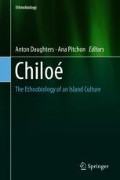Abstract
An almost mythic traditional barter system, known locally as trueque Chilote, between the islands of Chiloé and the surrounding fjordland communities of Patagonia, has been in place for centuries. Island and mainland communities exchange endemic varieties of heirloom potatoes for wooden posts made from local trees found in the dense coastal temperate rainforests of Patagonia. This chapter, based on ethnographic field research in the region conducted over 10 years, offers an account of the spatial, material, and social manifestations of this Chilote barter system. Drawing from interviews and participant observation data, I describe how the exchange provides vital resources to isolated communities where national currency is scarce or nonexistent, and explore its influence on the culture and landscape that is Chiloé.
Access this chapter
Tax calculation will be finalised at checkout
Purchases are for personal use only
Notes
- 1.
The English translation of “Trueque Chilote” is Chilote barter. Chilote barter will be used in the text to refer to the traditional, nonmonetary exchange of local products (specifically potatoes and wood) that is unique to the culture Chilote people of the Chiloé islands and mainland coasts of southern Chile.
References
Cellarius, B. 2000. You can buy almost anything with potatoes: An examination of barter during economic crisis in Bulgaria. Ethnology 39: 73–92.
FAO. 2011. Beijing declaration: A ten-point charter to promote the dynamic conservation of globally important agricultural systems (GIAHS). Crab Island, China: United Nations.
Humphery, C., and S. Hugh-Jones. 1992. Barter, exchange,and value: An anthropological approach. New York: Cambridge University Press.
Nahuelhual, L., P. Donoso, A. Lara, D. Nuñez, C. Oyarzún, and E. Niera. 2007. Valuing ecosystem services of Chilean temperate rainforests. Environment, Development and Sustainability 9: 481–499.
Sauer, C. 1969. Agricultural origins and dispersals. Cambridge, MA: M.I.T. Press.
Yao, S. 2010. True origins of widely used potato germplasm revealed. Agricultural Research 58: 22–22.
Author information
Authors and Affiliations
Corresponding author
Editor information
Editors and Affiliations
Rights and permissions
Copyright information
© 2018 Springer International Publishing AG, part of Springer Nature
About this chapter
Cite this chapter
Vercoe, R.A. (2018). Trueque Chilote: Traditional Barter Networks Connect Nature and Society in Northern Patagonia. In: Daughters, A., Pitchon, A. (eds) Chiloé. Ethnobiology. Springer, Cham. https://doi.org/10.1007/978-3-319-91983-6_5
Download citation
DOI: https://doi.org/10.1007/978-3-319-91983-6_5
Published:
Publisher Name: Springer, Cham
Print ISBN: 978-3-319-91982-9
Online ISBN: 978-3-319-91983-6
eBook Packages: Biomedical and Life SciencesBiomedical and Life Sciences (R0)

